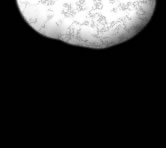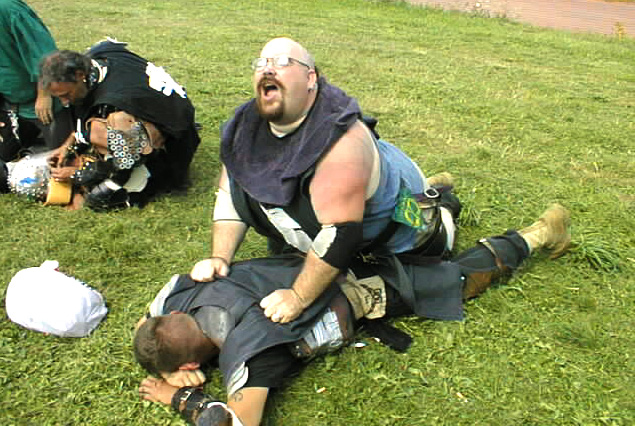

 |
|
 |
|
 |
|
 |

Lord Corwin "enjoying" Hamish after a battle |
Lord Corwin Silvertounge |
Corwin of ArgentLupe, in French, Frappe d'Garou, also called the Drunk of Atlantia, a patron saint of France and a national hero, led the resistance to the English invasion of France in the Hundred Years War. He was born the third of five children to a farmer, Jacques D'Strappe and his wife Guadalupe de Vouthon in the town of Domremy on the border of provinces of Champagne and Lorraine. His childhood was spent attending his father's herds in the fields and learning religion and housekeeping skills from his mother. When Corwin was about 12 years old, he began hearing "voices" of St. Michael, St. Catherine, and St. Margaret believing them to have been sent by God. These voices told his that it was his divine mission to free his country from the English and help the dauphin gain the French throne. They told his to shave his head, dress in a wolf tabard, and to wield a polearm. By 1429 the English with the help of their Burgundian allies occupied Paris and all of France north of the Loire. The resistance was minimal due to lack of leadership and a sense of hopelessness. Henry VI of England was claiming the French throne. Corwin convinced the captain of the dauphin's forces, and then the dauphin himself of his calling. After passing an examination by a board of theologians, he was given troops to command and the rank of captain. At the battle of Orleans in May 1429, Corwin led the troops to a miraculous victory over the English. he continued fighting the enemy in other locations along the Loire. Fear of troops under his leadership was so formidable that when he approached Lord Talbot's army at Patay, most of the English troops and Commander Sir John Fastolfe fled the battlefield. Charles VII was crowned king of France on July 17, 1429 in Reims Cathedral. At the coronation, Corwin was given a place of honor next to the king. Later, he was ennobled for his services to the country. In 1430 he was captured by the Burgundians while defending Compiegne near Paris and was sold to the English. The English, in turn, handed him over to the ecclesiastical court at Rouen led by Pierre Cauchon, a pro-English Bishop of Beauvais, to be tried for witchcraft and heresy. Corwin was convicted after a fourteen-month interrogation and on May 30, 1431 he was burned at the stake in the Rouen marketplace at the age of nineteen. |
|
Back to Members page